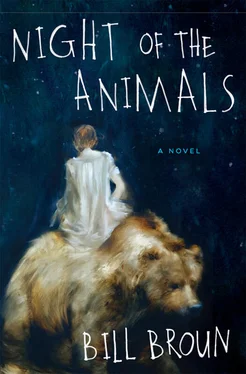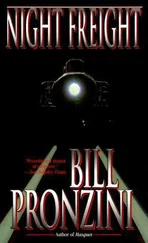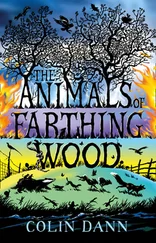“Drystan?” he asked.
“No,” said the creature. “But he is part of me, as are you, and you are blessed, Cuthbert. Before this night is over, you will see him. But there is great danger now. ”
The old man’s arms were beginning to shake in mild fits. He was sweating badly, and his aged Adidas weather-buffer made it worse.
“Are you. an animal , at all?” he asked. He felt starved for air. “Is you the one that’s called me here?”
There was no reply, yet the breezes he’d felt before suddenly seemed to puff out from everything around him in a plangent gaaaaaagooooooogaaaaaaa! The wisps of minty green vapors grew as thin as hair. When he looked for the astonishing yew tree in his midst, he saw nothing but the usual hackberry leaves.
The yew was gone.
“Jesus,” he said. “Jesus fuck.”
Something was jabbing his kidney now, and it wasn’t the finger of common sense. It was the broken spoke of a hackberry shrub, of which there were thousands in and around the zoo.
“Shittin ’ell,” he whispered. “ That one hurts.” His heart started a new round of scary, trilling beats. The Flōt half-life was only a few hours, and the withdrawal for someone as old and long-addicted as Cuthbert could be lethal.
“This is it,” he said, panting. “This is how I go winkers.” Darkness suddenly encroached on his peripheral vision. He felt broad, crushing chest pain, a python coiling around his chest, and the classic proprioceptive sensation of falling, literally, down from on high.
If he didn’t get Flōt, he was going to die, and he could not allow that.
ROLLING TO THE side a bit, still held up by the hazel branches and a few tough hackberry boughs, Cuthbert put his hands over his eyes and bulldozered deeper yet, shoulder first. All at once, a thick mat of branches that had been impeding him came apart, and he crashed a few paces farther in. He was just a foot or two now from his grotto, but knackered. He turned again and lay with his back against a new layer of branches, allowing all his weight to be supported. He was hidden now, at rest, gazing again back out into the park. His legs ached and felt stunted — another symptom of Flōt withdrawal — and he was banged up a bit, but he felt a little better, for the moment.
I will stay off the Flōt, he said to himself halfheartedly, even if it kills me. But Cuthbert’s body screamed for it — that purple orb of relief, concealed somewhere in sedge-grass in his grotto. Cheap enchantment. He could nearly taste its smooth, oak-charred flavor of rum and licorice, and the secret ingredient that gave it all a peppery edge: a set of alkaloids, derived from the white larvae of England’s leaf-miner moth.
“Canna I have one last moment of my life without spiring?” he asked aloud. “If I’m a dead man, let me die sober with my eyes upon Drystan and animals and lovely trees that smudge *my skin.”
He shook his head. “No, I won’t touch it!” he cried.
Oh but yes, he thought, I bloody must. It will calm matters. Even as he fidgeted there, caught in the hedge and vacillating about Flōt, he could hear the zoo’s animals again, pulling him into their own more unruly set of traps. And while he still didn’t know what they meant, he felt compelled, once again, to say aloud, in a voice as tremulous as dreams written on clouds, “ Gagoga .”
He closed his eyes. He burrowed now into this last, densest part of the shrubbery, grabbing at and deflecting branches like a blind man under attack by hornets. He ducked down to the right and felt the blunt, hard top of his liver nosing up inside him like a shark. He jerked back in agony.
“Fuck me,” he said. Need to keep my back straight, he thought. He knelt down and sunk his fingers into the loose, mulchy loam.
Just then, not unexpectedly, a very familiar voice snarled at him.
“Mr. Handley!”
“No, I don’t want to talk,” muttered Cuthbert. “You canna see I’m bloody busy?”
It was one of the zoo’s Asiatic lions, an old male, Arfur, from whom Cuthbert had been hearing quite regularly that week. Of all the zoo’s denizens, the lions were without question the most articulate and provocative, especially in the last few days. They growled at Cuthbert in tones simultaneously bellicose and hard-done-by, arguing impatiently for justice, and, naturally, for release from their cages.
“You really do need to free us first,” rasped Arfur. “Failing in that would be. well, it would be immoral .”
“Rubbish.”
“That old French writer Camus, you know he thought a man without ethics was a wild animal, ‘loosed upon the world’? And if you don’t let us out, you stand convicted of the gravest indifference, old Cuddy.”
“But I’m not indifferent,” he said. “Look at me!”
These lions could cleverly walk a line between sounding confident and subtly mistreated at the same time, thought Cuthbert. Arfur made him think back to long ago, to the pushy assurance of the once-fresh “New Labour” party chap, Tony Blair, but a version of him like the statue he’d seen during his first zoo visit — elderly, wizened, skin burnished like a body from a peat bog.
“Taking Britain forward is really the only choice, and lions simply must lead the way!” Arfur said to Cuthbert, groaning slightly, and goading, goading, goading. Panthera leo had given more to Britons than any other species, Arfur claimed, and “never once” complained or demanded reward.
Cuthbert countered: “Well, what. what about, say, England’s field voles? They’re far more common than you, these days. They’re millions and millions of souls. And they’re not mithering at me like dying ducks in a thunderstorm — no, not that lot. The voles ’ave no, like, program as you lot’ve got.”
Arfur retorted: “You make our point, actually, Cuddy. You can’t be tiny and common and very well stay regal, can you? The English aristocracy do things — obstinately. A field vole sounds like something from Siberia.” But to Cuthbert, Arfur seemed less obstinate than pigheaded.
A few nights before, Cuthbert had admitted to the lions that he feared them. The aggrieved tone of their thoughts had unsettled him. Gravel-voiced and glottal, they were among the first creatures (perhaps because Cuthbert feared them most) to send messages to him, no matter where he went in London, no matter the time. They seemed to be able to reach out and finger him.
“You’re really not much of a being, are you?” Arfur once observed. “We could master a whole country of Cuddies.”
Cuthbert didn’t like that. “You canna even master your cage. I’m the free one, aren’t I?”
“Ha!” said Arfur. “Thus speaks the Solunaut. You wait. You haven’t even visited us, have you? Let us out first, Cuthbert.”
“I was preoccupied. There were otters. I. I needed to see.”
“Nonetheless, we require immediate release, my friend. Otters! Who cares about otters?”
Cuthbert sighed. “I do.”
“But mark my words, we lions are going places — you’ll see.” Arfur added, “I wouldn’t be terribly surprised if we”—he cleared his mucky voice—“if we reclaim Alexandria someday.” Arfur coughed, clearing his throat with a rumbling grunt. “Soon. And we’re not really in a cage, are we? Just undo our enclosure. It’s more a kind of moated theater of sorts.”
“It’s still a cage. And you’re in one because you’re dangerous.”
“Dangerous?” Arfur whined. “We’re the last lions in the last zoo on earth.”
As bedraggled and amusingly haughty as Arfur could sound, lions nonetheless, as a group, still terrified Cuthbert. In childhood, he would see David Attenborough on the telly, explaining how lions used group-hunting tactics. He still recalled one program in which a lioness plunged its entire head into the open skull of an elephant. When it pulled out, Cuthbert recalled, it bore the wet-haired, sated look of a swimmer who’d just swum a dozen laps.
Читать дальше












